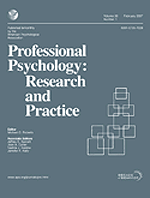Academic journal From Wikipedia, the free encyclopedia
The Professional Psychology: Research and Practice is a peer-reviewed, English language journal published six times per year by the American Psychological Association (APA). The journal "publishes conceptual and data-based articles on the issues and methods involved in the practice of psychology. Topics encompass a broad range, including health psychology, community psychology, family psychology, forensic psychology, and clinical neuropsychology".[1] The editor-in-chief is Ronald T. Brown (University of North Texas at Dallas).
 | |
| Discipline | Psychology |
|---|---|
| Language | English |
| Edited by | Ronald T. Brown |
| Publication details | |
Former name(s) | Professional Psychology |
| History | 1970–present |
| Publisher | |
| Frequency | Bimonthly |
| 1.716 (2020) | |
| Standard abbreviations | |
| ISO 4 | Prof. Psychol.: Res. Pract. |
| NLM | Prof Psychol Res Pr |
| Indexing | |
| ISSN | 0735-7028 (print) 1939-1323 (web) |
| Links | |
First published in 1970, as Professional Psychology, the name of the journal was extended to Professional Psychology: Research and Practice in 1983.
The journal has implemented the Transparency and Openness Promotion (TOP) Guidelines. [2] The TOP Guidelines provide structure to research planning and reporting and aim to make research more transparent, accessible, and reproducible. [3]
According to the Journal Citation Reports, the journal has a 2020 impact factor of 1.716.[4]
Seamless Wikipedia browsing. On steroids.